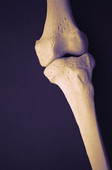
MONDAY, May 20 (HealthDay News) — Injections of a sugar solution appear to help relieve knee pain and stiffness related to osteoarthritis, a new study suggests.
The technique — known as dextrose prolotherapy — has been around for 75 years but is still considered an “alternative” therapy.
“Our study suggests very strongly that prolotherapy is a safe and appropriate therapy for people with mild to moderate knee osteoarthritis that hasn’t responded optimally to other therapy,” said lead researcher Dr. David Rabago, an assistant professor of family medicine at the University of Wisconsin School of Medicine and Public Health in Madison.
“We don’t know exactly what the mechanism of action is,” Rabago said. “One theory is the injections trigger a healing response at the point of the injection.”
It’s this lack of biological evidence that has kept prolotherapy from winning mainstream medical acceptance.
“Like a lot of complementary and alternative therapies, prolotherapy has existed mainly outside academia,” Rabago said. “It’s not something that’s taught in med school.”
Osteoarthritis is the most common form of arthritis, affecting nearly 27 million Americans, according to the Arthritis Foundation. Symptoms, which are related to wear and tear, usually start after age 40 and progress slowly. In the knee, arthritis causes pain, swelling and reduced motion.
For the study, published in the May/June issue of the journal Annals of Family Medicine, researchers assigned 90 patients with knee arthritis to either sugar injections, saline injections or exercise at home.
Patients who received injections got them at weeks one, five and nine, and at 13 and 17 weeks if needed.
After a year, patients given the sugar injections had less pain and better function as measured by test scores than those who were given saline or who only exercised, Rabago’s group found.
On scores of function, the sugar-injection patients improved 16 points, compared to five points for saline patients and seven points for exercise patients. Individual knee pain scores also improved more in the prolotherapy group, the study found.
Most patients who received prolotherapy were satisfied, and no adverse side effects were reported, the researchers said.
Some experts, however, remain unconvinced of prolotherapy’s benefits. Among them is Dr. Neil Roth, an orthopedic surgeon at Lenox Hill Hospital in New York City.
“I’m not a big believer in prolotherapy,” he said. “Injecting sugar into the knee joint doesn’t have an impact on osteoarthritis, which is an inflammatory process. I just don’t see the connection there.”
Any improvement associated with prolotherapy is probably a placebo effect, he said.
“If I were going to have an injection in my knee, I would much rather have something that’s more mainstream — something like cortisone,” he said.
Exercise and anti-inflammatory medications are Roth’s preferred treatment for arthritis of the knee, plus cortisone injections if needed.
Because prolotherapy is not used in common clinical practice, it is considered experimental and isn’t covered by Medicare or most private insurance. The therapy can cost $200 and up for each injection, and costs vary widely by location and therapist, Rabago said.
Although the researchers limited the number of injections to five, in clinical practice patients can continue to receive sugar treatments if pain returns or worsens, Rabago said.
More information
For more information on osteoarthritis, visit the U.S. National Library of Medicine.

